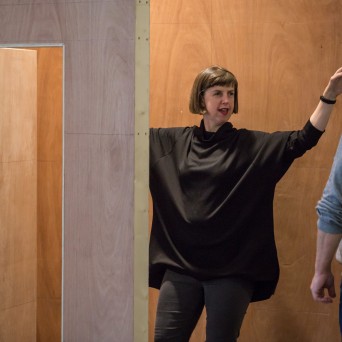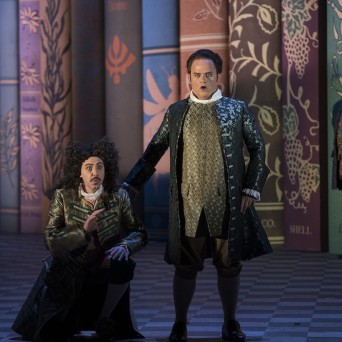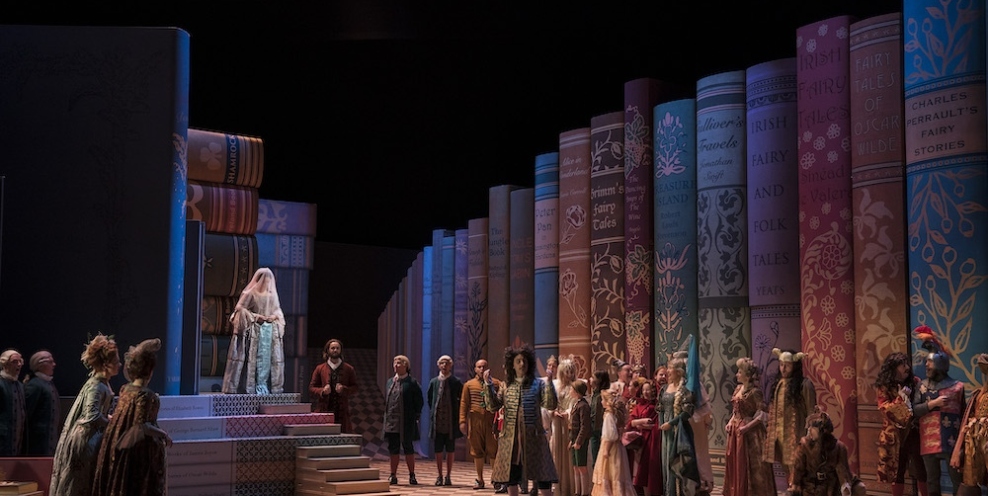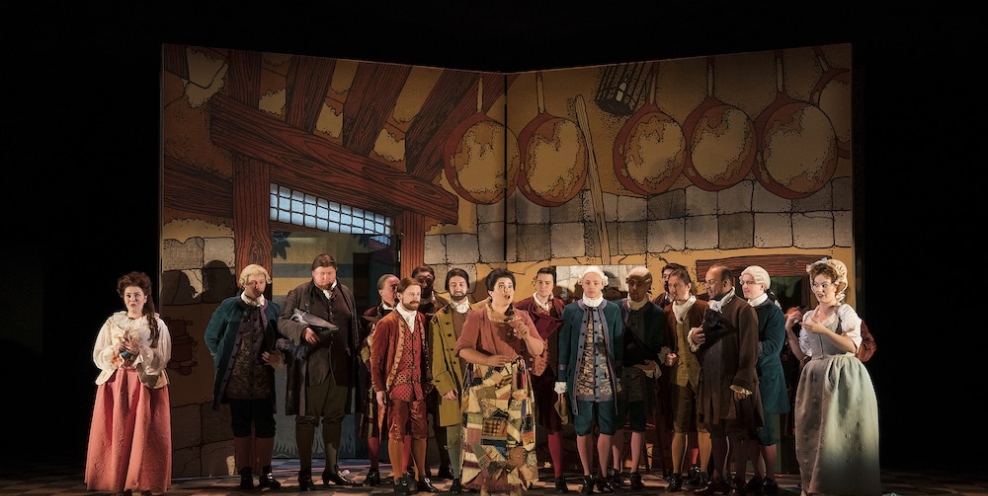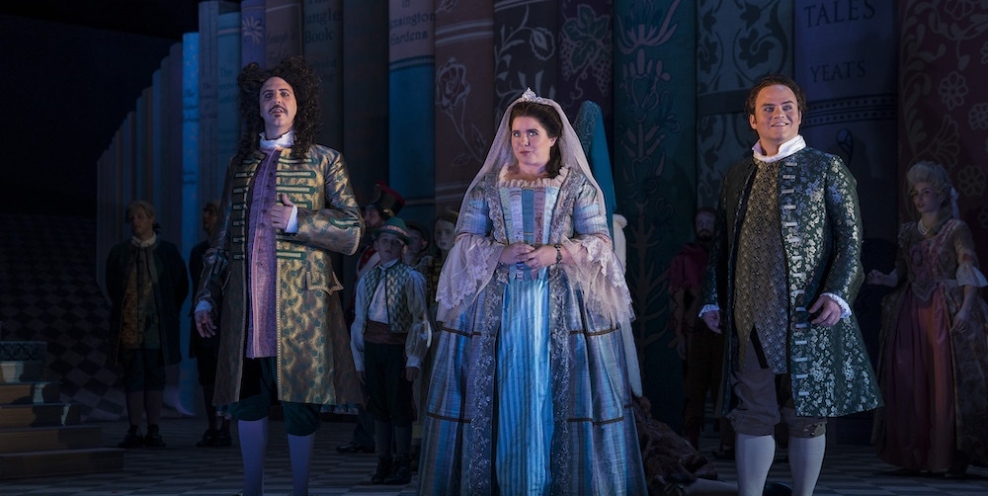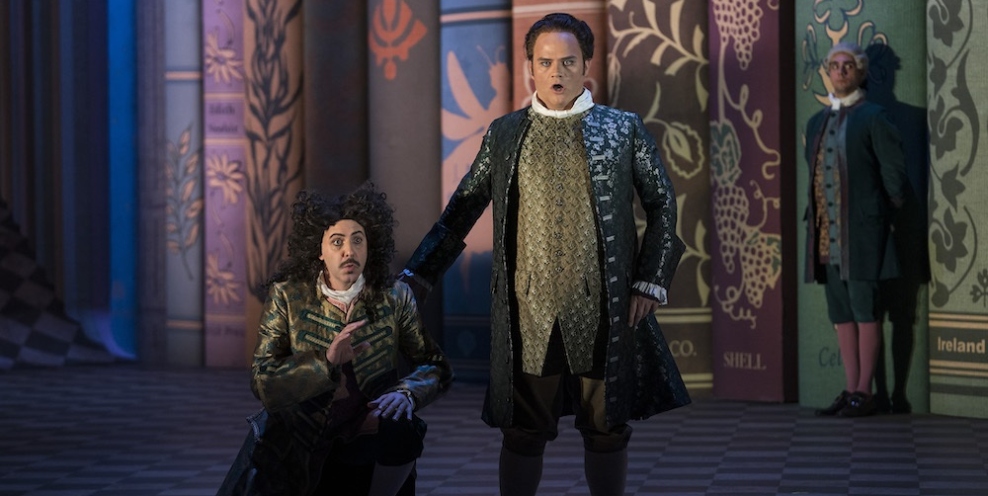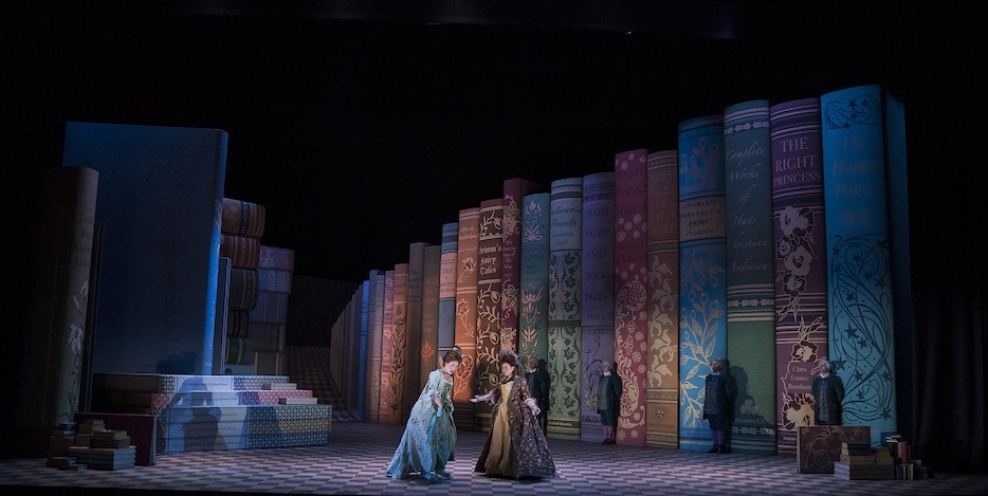Dates & Venues
| Sunday 10 Nov 6pm |
Sunday 10 Nov 6pm
Dublin
Bord Gáis Energy Theatre
|
|
| Tuesday 12 Nov 7.30pm |
Tuesday 12 Nov 7.30pm
Dublin
Bord Gáis Energy Theatre
|
|
| Thursday 14 Nov 7.30pm |
Thursday 14 Nov 7.30pm
Dublin
Bord Gáis Energy Theatre
|
|
| Saturday 16 Nov 7.30pm |
Saturday 16 Nov 7.30pm
Dublin
Bord Gáis Energy Theatre
|
Cinderella /
La Cenerentola
“It’s not fair!” the notion of justice is of paramount importance to children, and key to the appeal of the Cinderella story. But whatever your favourite version, you will find something uniquely dark, yet sparkling and touchingly redemptive in Rossini’s La Cenerentola.
Sung in Italian with English surtitles.
Running time is 3 hours including an interval of 20 mins after Act 1.
This production unfolds from the very pages of books and celebrates the idea of literature, of fantasy, of escapism, and most importantly of Goodness Triumphant. The age-old fairytale resonates as much today as it did in times gone by.
One half-priced child (under 16) ticket available for purchase with every full-priced adult ticket purchased.
The performance on Thursday 14 November will be recorded and filmed for future broadcast.
“a coup de theatre ⭐⭐⭐⭐⭐” - The Irish Times
“a miracle of perfection” - Conductor Riccardo Chailly
“Rossini’s musical imagination stops at nothing.” - Conductor Mark Elder
“I have yet to find a weak female character in Rossini. Cenerentola never wavers from her ideal.” - Mezzo-soprano Joyce Didonato
“She conjured effortless innocence with a full, round timbre that she projected spinning round the hall.” - Pittsburgh Post-Gazette on Tara Erraught
“...a secure, high Rossini tenor – wow! – such tenors are in demand.” - Der Neue Merker on Andrew Owens
IN PARTNERSHIP WITH THE BORD GÁIS ENERGY THEATRE

Cast & Creative Team
Cast
| La Cenerentola | Tara Erraught |
| Ramiro | Andrew Owens |
| Dandini | Riccardo Novaro |
| Don Magnifico | Graeme Danby |
| Alidoro | David Oštrek |
| Clorinda | Rachel Croash |
| Tisbe | Niamh O'Sullivan |
Creative Team
| Conductor | Fergus Sheil |
| Director | Orpha Phelan |
| Set & Costume Designer | Nicky Shaw |
| Lighting Designer | Matt Haskins |
| Choreographer | Muirne Bloomer |
| Irish National Opera Chorus | |
| Irish National Opera Orchestra |

Tara Erraught
Mezzo-soprano

Andrew Owens
Tenor

Riccardo Novaro
Baritone

Graeme Danby
Bass
This Season
La traviata
David Oštrek
Bass-baritone

Rachel Croash
Soprano
This Season
Rusalka
Niamh O'Sullivan
Mezzo-Soprano
This Season
Beatrice & Benedict, Rigoletto
Fergus Sheil
Conductor
This Season
Madama Butterfly, Rusalka
Orpha Phelan
Director
This Season
La bohème
Nicky Shaw
Set & Costume Designer
This Season
La bohème
Matt Haskins
Lighting Designer
This Season
La bohèmeSynopsis
ACT 1
In their run-down home, sisters Clorinda and Tisbe are perfecting their party pieces. Cenerentola sings a little song and gets on her stepsisters’ nerves. Alidoro, the tutor of Prince Ramiro, pays the girls a visit. But he’s disguised as a beggar and so Clorinda and Tisbe are disgusted by his rags. Cenerentola, however, offers him some breakfast, letting him know there is one kind person in the house worthy of the prince’s affections. Courtiers bring the good news that their prince is to hold a ball, with the aim of finding himself a bride. Clorinda and Tisbe are so excited at the prospect of bagging themselves a prince that they inadvertently wake up their father. Don Magnifico is unhappy at being roused from his slumber and recounts a dream about the family rising from their poverty. When the girls tell him about the prince, he hopes that he has at last found a solution to his financial worries. Prince Ramiro wants to understand the hearts of the women around him and thinks he will get truer readings if he disguises himself as his valet Dandini. When he bumps into a girl in rags, the two are struck by each other. Cenerentola becomes confused in her attempts to explain that her mother was a widow who married Magnifico, and that she has two stepsisters. Soon yet another person arrives in disguise. This time it’s Dandini, dressed as the prince and with his retinue in tow, patently enjoying the attention lavished upon him by Clorinda, Tisbe and their father. As the two sisters head off to the ball, Cenerentola begs her father to allow her to go too. Magnifico’s cruelty knows few bounds and he refuses her. When Alidoro interrogates him as to the whereabouts of his third daughter, he replies that she is dead. But after everyone has left, Alidoro reassures Cenerentola that she will indeed go to the ball and provides her with a gown, jewellery and a carriage. Dandini wants to get to know the girls better on behalf of Prince Ramiro, so he needs to keep their father out of the way. He devises a new role for Magnifico – chief sommelier. Magnifico is thrilled that his fortunes are changing for the better. When he leaves to inspect the wine cellars, the girls are shameless in their pursuit of the ‘prince’. Dandini escapes, but not before promising them both separately that they have each captured his heart. The courtiers listen attentively to their new chief sommelier. With his superior role, Magnifico’s sense of power becomes more and more inflated. Dandini spills the beans to Ramiro – Clorinda and Tisbe are vacuous and vain. The girls spy him out and begin fighting over him again, so he explains that he cannot marry both. He will simply marry one and offer the other to his valet. They are blind to the fact that they are insulting the real prince when they announce that they feel sick at the thought of marrying someone as common as a valet. Alidoro brings news of a new, unknown, veiled guest. The girls are terrified at the thought of a rival. Everyone is stunned when Cenerentola removes her veil; though in much finery, she is so similar to the girl seen in rags earlier! Cenerentola challenges anyone who wishes to have her as a bride to offer her respect, love and kindness instead of riches. Ramiro feels a sense of hope again. Magnifico, having already sampled far too much wine, brushes the family’s concerns aside. After all, he left Cenerentola at home by the ashes where she belongs. But nonetheless, with such tension in the air, everyone feels a sense of trepidation as they all go off to dine.
ACT II
Magnifico makes his financial situation clear to Clorinda and Tisbe. He becomes enamoured with the idea of power and wealth as he imagines one of them ascending to the throne. Ramiro is very taken with the unknown girl, who reminds him so much of the unfortunate creature he met earlier. Cenerentola, with Dandini in hot pursuit, looks for a place to hide. But she can’t escape Dandini for long, so she makes her feelings for the ‘prince’ very clear: she is sorry, but she simply loves his ‘valet’. Ramiro is naturally delighted to hear this, and is ready to tie the knot. But Cenerentola tells him that he must first get to know her properly. Before slipping away quietly, she gives him a bracelet, and explains that he will know he has met the right girl when he finds someone with a matching bracelet on her own wrist. Ramiro, now that he has found someone who loves him for who he truly is, is ready to dress as a prince again. With the help of his faithful followers he vows to find the girl with the bracelet. Poor Dandini, whose fall from influence has been rather abrupt, enjoys his final moments of deception before revealing to Magnifico that he is in fact only a penniless and powerless valet himself. The unfortunate father, with his financial ruin as real as ever, vows that he will have an explanation from the real prince. Alidoro is pleased to see that things are working out, just as he had planned. The stormy night will help his plan further. Back at Magnifico’s house, Cenerentola is humming her song again when Magnifico and his daughters arrive back in a fury. They are deeply suspicious of Cenerentola. But she appears to have been at home all night. With the onset of a violent storm, Ramiro and his retinue seek shelter in the home of Magnifico. Magnifico’s hopes are raised once more when he realises the identity of the real prince, but it’s not long before Ramiro recognises the bracelet on Cenerentola’s wrist. Cenerentola is equally surprised to find that the man she loves is in fact a prince. In one last attempt to claw their way to power, Cenerentola’s family orders her to go away and never to come back. But the prince reminds them of their own words – he is after all too ‘common’ for them – and he asks Cenerentola to be his bride. She accepts his proposal, but requests that he forgive her family for their failings and that he allow goodness to be triumphant: e trionfi la bontà. Still proud, and rather injured, Magnifico and his daughters lick their wounds. They are eventually won over by Cenerentola’s magnanimity. All comment that although she is worthy of the throne, Cenerentola has risen above it. In her goodness and kindness, all find redemption. And Magnifico will be rich!




